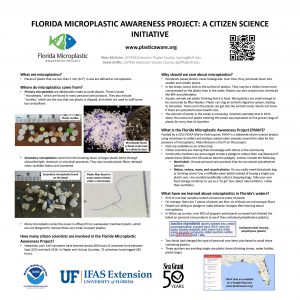FLORIDA MICROPLASTIC AWARENESS PROJECT: A CITIZEN SCIENCE INITIATIVE
M. McGuire, UF/IFAS Extension, Flagler County, Bunnell, FL and David Griffis, UF/IFAS Extension, Volusia County, DeLand, FL.
Situation: Plastic pollution in the oceans is an increasing problem. Microplastics (plastic pieces smaller than 5 mm in size) are being found in fish and invertebrates, and could potentially cause human health concerns. The Florida Microplastic Awareness Project aims to raise awareness about the sources of and threats posed by microplastics, in part by having citizen scientists collect and analyze coastal water samples for the presence of microplastics. The project asks people to take a pledge to reduce their contribution to the plastic problem—people indicate their willingness to take certain actions, and, if they provide their e-mail address, are sent a follow-up survey to assess which behaviors have actually been adopted. Methods: Educational materials (volunteer manual, PowerPoint presentation, brochure, tabletop display, pledge, website) were developed. Sixteen coordinators from around the state (including eleven UF/IFAS Extension agents) have been trained to implement the project in their regions. Coordinators are giving presentations about microplastics to potential volunteers, then conducting hands-on trainings to show water collection and analysis techniques. Volunteers are asked to collect at least four samples during the year. Data are entered into an online form, and used to populate a Google Map. Results: Data from 200 water samples shows that 90% contained at least one plastic item. 85% of the plastics found are microfibers. On average, there are seven pieces of plastic in a liter of coastal water. Pre- and post-tests given to 110 people attending microplastics presentations showed a knowledge gain. Overall, test scores increased by 50 percentage points, from an average of 46% on the pre-test to 96% on the post-test. Over 85% of program participants surveyed had checked the labels on personal care products to see if they contained polyethylene (plastic). Two thirds had changed the type of personal care items purchased to avoid those containing plastics. Three quarters are avoiding single-use plastic items (drinking straws, water bottles, plastic bags. Conclusion: People learning about microplastics are willing to take steps to reduce their contribution to the problem.
CLICK ON POSTER TO ENLARGE
 0
0

